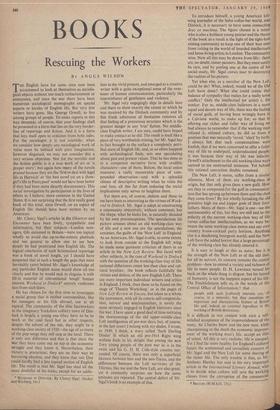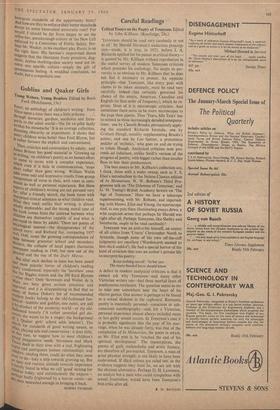BOOKS
- Rescuing the Workers
BY
ANGUS WILSON
THE English have for some time now been accustomed to look at themselves as sociolo- gical objects without too much embarrassment or annoyance, and since the war there have been numerous sociological monographs on special aspects or locales of English life. But very few writers have gone, like George Orwell, to live among groups of people. To make reports in this way demands, of course, that your findings shall be presented in a form that lies on the very border- line of reportage and fiction. And it is a form that lays itself open to criticism from both sides. For the sociologist it is not scientific; when we consider how deeply any sociological work of Value must be imbued with pure imagination, however disguised, we may not consider this a very serious objection. Nor for the novelist and the fiction public is it a true work of art or 'a proper story'; but again how many of the novels praised because they are the 'first to deal with legal life in Harwich' or 'the best novel yet on a show- girl's life in Pontypool' would not have been better if they had been more directly documentary. This social investigation by participation in the lives of Others is, I believe, more common in the United States. It is not surprising that the first really good book of this kind, since Orwell, on an aspect of English life should have been written by an American.
Mr. Clancy Sigal's articles in the Observer and Encounter have been lively, sympathetic and informative, but their subjects—London teen- agers, GIs stationed in Britain—were too topical wholly to avoid the up-to-the-minute platitude and too general to allow one to see how deeply he had penetrated into English life. The logical conclusion of such fictionalised reportage was a book of novel length, yet I should have suspected that at such a length the gaps that must inevitably yawn behind Mr. Sigal's knowledge of any particular English scene would show all too clearly and that he would seek to disguise it with fill-in material of conventional 'tough' human interest. Weekend in Dinlock* entirely vindicates him from such fears.
He has chosen for the first time to investigate a social group that is neither cosmopolitan, like his teenagers or his GIs abroad, nor at all topical. The community of the elite faceworkers in the imaginary Yorkshire colliery town of Din- lock is largely a young one (they have to be to work at the coal face) but in other respects, despite the advent of the tele, they might be a working-class society of 1920—the age of so many of the pop songs they still sing at the local. There is only one difference and that is that since the war they have come out on top in the economic struggle and they know it. Nevertheless, their victory is precarious; they are on their way to becoming obsolete, and they know that too. One could hardly find a less topical section of English life. The result is that Mr. Sigal has shed all the more doubtful of his tricks, except for an addic-
* WEEK END IN DINLOCK. By Clancy Sigal. (Seeker and Warburg, I 6s.)
tion to the vivid present, and emerged as a creative writer with a quite exceptional sense of the over- tones of human communication, particularly the intermixtures of gentleness and violence.
Mr. Sigal very engagingly slips in details here and there to show exactly the extent to which he was received by the Dinlock community and by this frank admission of limitation removes all that feeling of a precarious structure which is the greatest danger in any 'true' fiction. No middle- class English writer, I am sure, could have hoped to make contact as he did. The result is itself like a piece of very worthwhile mining, for Mr. Sigal has in fact brought to the surface a completely petri- fied seam of English life, and, as so often happen with archaeological finds, sets one speculating about past and present values. That he has done so in a competent narrative form with credible characters—one of them, Bolton, the local union treasurer, a really memorable piece of com- pounded observation—and with a splendid climax of descriptive writing when he visits the coal face, all this far from reducing the social implications only serves to heighten them.
Yet there are, of course, defects and these to me have been as interesting as the virtues of Week- end in Dinlock. Mr. Sigal is adept at constructing a community objectively, without comment; but the shape, what he looks for, is naturally dictated by his own preconceptions. The speculations his picture arouses about an old working-class way of life and a new one are the speculations, the anxieties, the guilts of the 'New Left' in England. As an American, Mr. Sigal is able, to some extent, to look from outside at the English left wing, he made some pertinent criticism of them in an article in the New Left Review. But faced with other subjects, in the case of Weekend in Dinlock with the question of the working-class way of life, national differences count less than class and cul- tural loyalties : the book reflects faithfully the virtues and defects of the new English Left. There are more important individual writers and critics in England, I think, than those to be found on the stage of 'Theatre Workshop,' or in the pages of New Left Review or Encore, but taken as a whole the movement, with all its coterie self-congratula- tion, naïveté and sentimentalism, is surely the most seriously engaged in English literature since the war. I have spent a good deal of time satirising
the shortcomings of the old upper-middle-class Left intelligentsia of pre-war days, but, of course, in the last resort I belong with my dodos. 1 wrote, in 1949, I think, a story called 'Such Darling Dodos' rn which an old pre-1914 Right wing esthete finds to his delight that among the new
Tory young people of the post war he is in the swim and his G. D. H. Cole-style cousins out- moded. Of course, there was only a superficial
likeness between him and the neo-Tories, and the differences between the Left survivors of the Thirties, like me and the New Left, are also great, yet it constantly surprises me how the same attitudes are repeated. The central defect of Mr. Sigal's book is an example of this.
To introduce himself, a young American left- wing journalist of the Soho coffee-bar world, into Dinlock, it is necessary to have some connecting deus ex machina. The figure chosen is a miner who is.also a brilliant young painter and the theme of the book as a result is the fight of the tight-knit mining community to keep one of their best men from ratting to the world of bearded intellectuals and loose-living artists in London. The community wins. Now all this may be drawn from life : there are, no doubt, miner-painters. But they must surely be rare, and by putting one at the centre of his social study, Mr. Sigal comes near to destroying the realism of his picture.
Yet what else, as a member of the New Left, could he do? What, indeed, would we of the Old Left have done? What else could create that balance of sympathy that makes for a really tense conflict? Only the intellectual (or artist) v. the worker. For us, middle-class believers in a more equal and decent way of life, there was the feeling of social guilt, of having been wrongly born in a Calvinist world, to make up for; so that in offering our richer and fuller way of living we had always to remember that if the working man refused it, refused culture, he did so from a position that was naturally `saved,' elecr by birth. I always felt that such compensations were foolish, that if we were concerned to offer a fuller way of life to underpaid, undereducated people, it was because their way of life was inferior. Orwell's attachment to the old working-class ways seemed to me sentimental nonsense. Yet behind this rational conviction doubts remained.
The New Left, it seems, suffer from a similar dilemma. Most of them are working-class in origin, but that only gives them a new guilt. How are they to compound for the gulf in communica- tion that has sprung up between them and the class they come from? By not wholly forsaking the old primitive high tea and kipper gods of their fore- fathers. Many of them—Mr. Sigal is one—see the sentimentality of this, but they are still tied to the polarity of the narrow working-class way of life versus coffee-bar intellectualism, as we were be- tween the same working-class mores and our own country house-cocktail party horizon. Anything else is a deadening bourgeois world; and the New Left have the added horror that a large percentage of the working class has already entered it.
It is easy to laugh at this as naïve, but it is the strength of the New Left as of the old that, for all its naïveté, its concern remains the central problem—how to extend a variety and richness of life to more people. D. H. Lawrence turned his back on the whole thing in disgust; but his hatred of humanity is not the happiest aspect of his life. The Establishment tells us, in the words of the Central Office of Information,t that people with such [cultural] interests arc. 01 course, in a minority, but they constitute a" important and characteristic feature of British life and, indeed, an essential ingredient in the working of British democracy.
It is difficult to rest content with such a self- satisfied acceptance of the impoverishment of the many. Sir Charles Snow and the new men, while championing to the death the economic improve- ment of the working man's life, accept an elite of talent. All this is very realistic; life is unequal, Yet I find far more healthy for England's cultural future the sentimental and unrealistic concern 01
Mr. Sigal and the New Left for some sharing of the richer life. The only trouble is that, as Mr.
Anthony Hartley has said in his very important article in the International Literary Annual, wh° is to decide what. culture will save the working classes from the corruption of the commercial t BRITAIN. (H.M .S.O., 25s.) bourgeois standards of the opportunity State? And how are they to enforce their better standards except by some benevolent autocratic rule? For Myself I should be far from happy to see the coffee-bar, pseudo-tough culture of the New Left enforced by a Committee of Public Safety. Per- haps Mr. Wesker, in his excellent play Roots, is on the right lines. His heroine's improvised dance suggests that the liberation from primitive, dog- matic, joyless working-class society need not in- volve any specific culture—simply the gift of spontaneous feeling. A muddled conclusion, no doubt, but a sympathetic one.







































 Previous page
Previous page